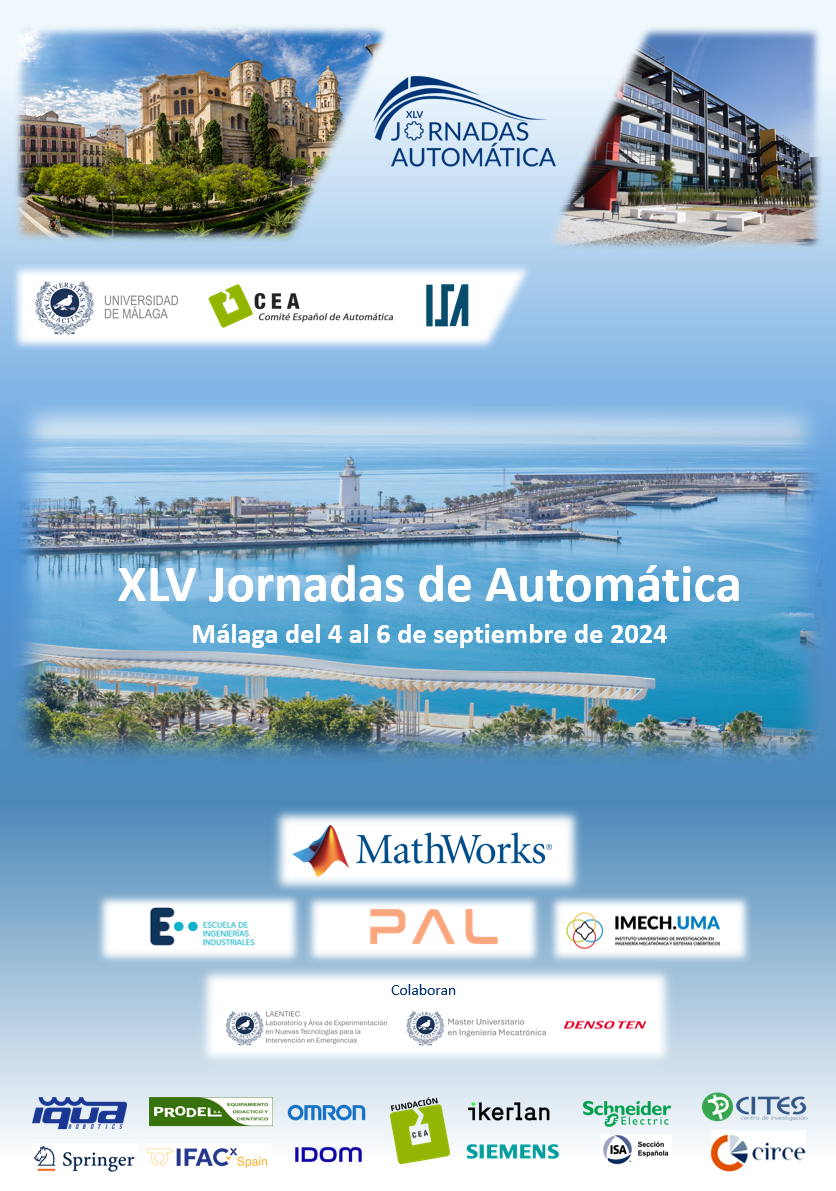Método práctico para la estimación de parámetros en un intercambiador de calor
DOI:
https://doi.org/10.17979/ja-cea.2024.45.10746Palabras clave:
Control de calor y transferencia de masa, Sistemas con retardos, Identificación de sistemas no linealesResumen
En este trabajo se presentan resultados preliminares de un método práctico de identificación para su uso en laboratorio o en industria. La propuesta viene motivada por la necesidad de obtener los parámetros de un modelo de intercambiador a partir de mediciones de campo. El trabajo se centra en parte de una planta de almacenamiento de energía en construcción. El intercambiador considerado usa agua como fluido secundario para enfriar el aire comprimido a la salida de un compresor industrial. El principal reto para la identificación es que la mayoría de variables no son modificables a voluntad debido a las características de la planta. Esto impide el uso de técnicas como la respuesta a escalón. Por otro lado, durante el uso normal del equipo, algunas variables están fuertemente correlacionadas, dificultando el uso de técnicas basadas en datos. La propuesta emplea una construcción poco invasiva para sortear los citados obstáculos mediante la introducción de señales en rampa en una de las principales variables.
Referencias
Al Hadad, W., Jannot, Y., Maillet, D., 2016. Characterization of a heat exchanger by virtual temperature sensors based on identified transfer functions. In: Journal of Physics: Conference Series. Vol. 745. IOP Publishing, p.032089.
Alsop, A. W., Edgar, T. F., 1989. Nonlinear heat exchanger control through the use of partially linearized control variables. Chemical Engineering Communications 75(1), 155–170.
Álvarez, J., Yebra, L., Berenguel, M., 2007. Repetitive control of tubular heat exchangers. Journal of Process Control 17 (9), 689–701.
Arahal, M. R., Berenguel, M., Rodríguez, F., 2006. Técnicas de predicción con aplicaciones en Ingeniería. Vol. 15. Universidad de Sevilla.
Beschi, M., Padula, F., Visioli, A., 2016. Fractional robust PID control of a solar furnace. Control Engineering Practice 56, 190–199.
Beschi, M., Padula, F., Visioli, A., 2017. The generalised isodamping approach for robust fractional PID controllers design. International Journal of Control 90 (6), 1157–1164.
Casteleiro-Roca, J.-L., Barragán, A. J., Segura, F., Calvo-Rolle, J. L., Andújar, J. M., sep. 2019. Intelligent hybrid system for the prediction of the voltage-current characteristic curve of a hydrogen-based fuel cell. Revista Iberoamericana de Automática e Informática industrial 16 (4), 492–501.
Gupta, S., Gupta, R., Padhee, S., 2018. Parametric system identification and robust controller design for liquid–liquid heat exchanger system. IET Control Theory & Applications 12 (10), 1474–1482.
London, A., Nottage, H., Boelter, L., 1941. Determination of unit conductancesfor heat and mass transfer by the transient method. Industrial & Engineering Chemistry 33 (4), 467–473.
Oravec, J., Bakosová, M., Trafczynski, M., Vasickaninov ́a, A., Mészáros, A., Markowski, M., 2018. Robust model predictive control and PID control of shell-and-tube heat exchangers. Energy 159, 1–10.
Pekar, L., 2020. Advanced Analytic and Control Techniques for Thermal Systems with Heat Exchangers. Academic press.
Piotrowska, E., Chochowski, A., 2012. Application of parametric identification methods for the analysis of the heat exchanger dynamics. International journal of heat and mass transfer 55 (23-24), 7109–7118.
Rodríguez, C., Guzmán, J., Rodríguez, F., Berenguel, M., Arahal, M. R., 2010. Diurnal greenhouse temperature control with predictive control and online constrains mapping. IFAC Proceedings Volumes 43 (1), 140–145.
Salimpour, M. R., 2009. Heat transfer coefficients of shell and coiled tube heat exchangers. Experimental thermal and fluid science 33 (2), 203–207.
Sanchis, R., Peñarrocha-Alós, I., 2022. A new method for experimental tuning of PI controllers based on the step response. ISA transactions 128, 329–342.
Sanz Bermejo, F. J., Ramírez Laboreo, E., Sagüés Blázquiz, C., may 2023. Structural identifiability analysis of a heat transfer system. Revista Iberoamericana de Automática e Informática industrial 20 (4), 412–420.
Skogestad, S., 2001. Probably the best simple PID tuning rules in the world. In: AIChE Annual Meeting, Reno, Nevada. Vol. 77. Citeseer, p. 276h.
Srinivasan, A., Lakshmi, P., 2008. Wiener model based real-time identification and control of heat exchanger process. J. Automation and Systems Engineering.
Vasickaninová, A., Bakosová, M., Cirka, L., Kalúz, M., Oravec, J., 2018. Robust controller design for a laboratory heat exchanger. Applied Thermal Engineering 128, 1297–1309.
Yedra, R. M., Rodríguez, F., del Mar Castilla, M., Arahal, M. R., 2014. A neural network model for energy consumption prediction of ciesol bio-climatic building. In: International Joint Conference SOCO’13-CISIS’13-ICEUTE’13: Salamanca, Spain, September 11th-13th, 2013 Proceedings. Springer, pp. 51–60.
Descargas
Publicado
Número
Sección
Licencia
Derechos de autor 2024 Manuel G. Satué, Michele Schiavo, Manuel G. Ortega, Manuel Beschi, Antonio Visioli, Manuel R. Arahal

Esta obra está bajo una licencia internacional Creative Commons Atribución-NoComercial-CompartirIgual 4.0.





